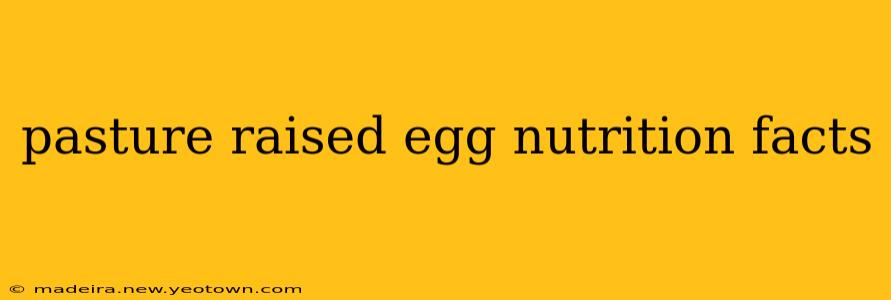Forget everything you thought you knew about eggs. While all eggs offer a good source of protein and essential nutrients, pasture-raised eggs take things to a whole new level. Their superior nutritional profile stems directly from the hens' diet and lifestyle. Imagine a hen happily pecking at grass, foraging for bugs, and basking in the sun – that's the life of a pasture-raised hen, and the result is an egg packed with goodness. Let's delve into the fascinating world of pasture-raised egg nutrition.
What Makes Pasture-Raised Eggs Different?
The difference between pasture-raised eggs and those from caged or confined hens isn't just about taste; it's a significant nutritional upgrade. Hens roaming freely on pasture have access to a diverse diet rich in greens, insects, and seeds. This varied diet translates directly into the egg's nutritional composition. While a standard supermarket egg provides essential nutrients, pasture-raised eggs boast significantly higher levels of certain vitamins and healthy fats.
Are Pasture-Raised Eggs More Nutritious Than Regular Eggs?
Yes, the answer is a resounding yes! Independent studies have shown that pasture-raised eggs generally contain:
- Higher levels of Omega-3 fatty acids: These beneficial fats are crucial for heart health and brain function. Pasture-raised hens naturally incorporate more Omega-3s into their eggs due to their diet.
- More Vitamin E: This powerful antioxidant protects cells from damage and supports immune function.
- Increased Vitamin A: Essential for vision, immune function, and cell growth, Vitamin A levels are noticeably higher in pasture-raised eggs.
- Higher levels of lutein and zeaxanthin: These carotenoids are beneficial for eye health, protecting against age-related macular degeneration.
- More Vitamin D: While the exact levels depend on sunshine exposure, pasture-raised hens generally have better access to sunlight, which helps with Vitamin D synthesis.
What are the Benefits of Eating Pasture-Raised Eggs?
The nutritional boost from pasture-raised eggs translates into numerous health benefits:
- Improved heart health: The higher Omega-3 fatty acid content contributes to better cholesterol levels and reduced risk of heart disease.
- Enhanced brain function: Omega-3s are crucial for brain development and cognitive function.
- Stronger immune system: The increased Vitamins A and E support a robust immune response.
- Better eye health: Lutein and zeaxanthin protect against age-related macular degeneration and cataracts.
- Increased nutrient absorption: The naturally occurring nutrients are better absorbed by the body compared to synthetically added nutrients.
How Many Pasture-Raised Eggs Should I Eat Per Week?
There's no magic number, but incorporating pasture-raised eggs into your diet several times a week can significantly boost your nutrient intake. Moderation is key, just like with any food. Consider them a part of a balanced diet.
Are Pasture-Raised Eggs Worth the Extra Cost?
The slightly higher price tag often associated with pasture-raised eggs reflects the higher cost of production—the hens require more space, land, and care. However, the substantial nutritional upgrade and the ethical considerations surrounding animal welfare make the premium a worthwhile investment for many consumers. For those prioritizing health and sustainable farming practices, the extra cost is often viewed as a worthwhile expense.
What's the Difference Between Pasture-Raised, Free-Range, and Cage-Free Eggs?
This is a crucial distinction! While the terms might seem interchangeable, they represent different levels of hen welfare and access to pasture:
- Cage-Free: Hens are not confined to cages but may still be housed in barns with limited outdoor access.
- Free-Range: Hens have access to the outdoors, but the extent of their range and the quality of their environment can vary widely.
- Pasture-Raised: This signifies that hens have continuous access to pasture, where they can forage for food and engage in natural behaviors. This ensures the highest quality of nutrition and welfare.
In conclusion, pasture-raised eggs aren't just eggs; they are a nutritional powerhouse, offering a significant upgrade to your diet. By supporting pasture-raised egg producers, you are not only enriching your meals but also contributing to more humane and sustainable farming practices. Choose wisely, and choose pasture-raised!

